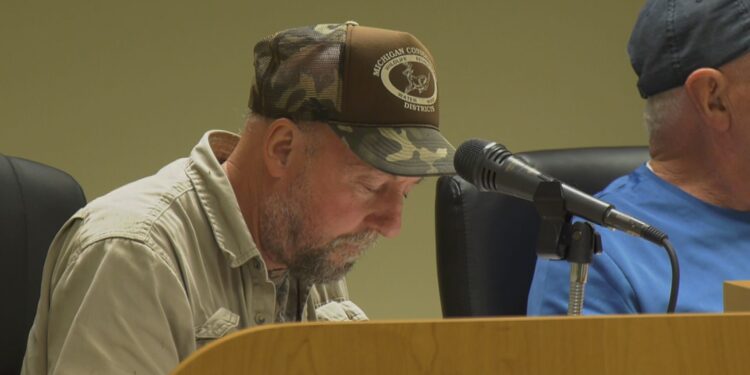DELTA COUNTY, Mich. (WZMQ) – The Michigan Department of the Attorney General has responded to the Delta Conservation District’s concerns about a potential “conflict of interest” regarding former District Manager and CEO Rory Mattson.
In August of last year, the Delta Conservation District Board voted to seek the Attorney General’s services in the matter of a “deal” Board Chair Joe Kaplan said Mattson coordinated regarding part of the Cornell Forest that was purchased by the county through the DNR Trust Fund. According to Kaplan, Mattson limited the public’s access to a trail on a part of the land that Mattson later purchased by asking the Delta County Board of Commissioners to modify an easement agreement.
In a letter sent on March 20, the Attorney General’s office told the Conservation District, “The purpose of this letter is to inform you and the Delta County Conservation District Board of Directors of what the Michigan Department of Agriculture and Rural Development believes to be a long history of potential violations of Part 93, Soil Conservation Districts, of the Michigan Natural Resources and Environmental Protection Act, MCL 324.9301 et seq. Specifically, these potential violations involve the District’s longstanding practice of offering services to private clients as an environmental consulting firm, including District staff members acting as paid expert witnesses in environmental enforcement lawsuits brought by the State of Michigan.”
The letter continues later on, “The Department provides the District $50,000.00 per year in grant funding, and the District receives additional grant funding from the United States Department of Agriculture. The use of government grants for running what amounts to a private environmental consulting business out of a government office is contrary to the requirements and limitations of Part 93.”
Kaplan spoke with WZMQ 19 on Thursday about his reaction to the letter.
“It certainly sends a strong message, not only to our district but to others, that we sort of have to stay in our lane with how we do our business,” he said. “In this last year, we’ve taken measures to basically address what we saw as deficiencies in transparency and accountability. We’ve done a lot of the things, I believe, that will satisfy the AG’s concerns over how this district was run in the past.”
Toward the end of the letter, the Attorney General’s office states, “In sum, it appears that the District, through the actions of Mr. Mattson, has a long history of violating Part 93.” The department also addressed potential remedies to Mattson’s actions.
“First, Part 93 provides that ‘To be eligible for a grant of $50,000 or more from the department, a district shall do all of the following . . . . (d) Agree to comply with subsection (10), and agree to return any grant funds received if section (10) is violated.’ MCL 324.9307(9). …the Department would be within its rights to seek a return of $50,000.00 per year for the past 8 years. Additionally, the Department holds the ability to remove any Director from the Board for neglect of duty or malfeasance in office.”
The letter says Mattson’s actions appear to have been taken with the “full awareness” of former Conservation District Board members. However, since the board has gone through several changes in personnel since the events in question took place, the Attorney General Department says it “does not wish to punish the current Board for the wrongdoing of former District employees or Directors.”
“Rather, it is the Department’s hope that the District’s practices will improve such that they comply with the controlling law,” the letter reads. “The Department is willing
to refrain from taking the above-described enforcement actions in exchange for a demonstration by the District that it has changed these practices and that it is committed to adhering strictly to the requirements of Part 93. …If that is the case, then the Department believes that this matter can be resolved amicably, without the need for enforcement action.”
Kaplan is optimistic about the current board’s response to Mattson’s actions and the steps it has taken to comply with state law.
“We’re just going to stay the course,” he told WZMQ 19. “I think we realigned what our core mission was with forestry and agricultural assistance and conservation technical assistance, and I believe that should satisfy the Attorney General. We will take the allegations that the Attorney General provided us and we’ll address them and what measures we’ve taken to make sure that we go forward with a clear conscience and good work on behalf of our community.”
The Attorney General Department has asked the Conservation District Board to provide a list of steps taken to correct the issues addressed within 30 days.
Read the full letter to the Delta Conservation District from the Attorney General’s office below.
Mr. Kaplan:
The purpose of this letter is to inform you and the Delta County Conservation
District Board of Directors of what the Michigan Department of Agriculture and
Rural Development believes to be a long history of potential violations of Part 93,
Soil Conservation Districts, of the Michigan Natural Resources and Environmental
Protection Act, MCL 324.9301 et seq. Specifically, these potential violations involve
the District’s longstanding practice of offering services to private clients as an
environmental consulting firm, including District staff members acting as paid
expert witnesses in environmental enforcement lawsuits brought by the State of
Michigan. Additionally, the Department has concerns about the District’s financial
management and recordkeeping practices.
It is the Department’s understanding that former District Forester Mr. Rory
Mattson acted as a private consultant and/or expert witness for the defense in at
least three enforcement actions brought by the Michigan Department of
Environment, Great Lakes, and Energy (formerly known as the Department of
Environmental Quality) for alleged violations of Michigan’s wetlands and/or sand
dunes laws. Mr. Mattson appeared as an expert witness for the defense in the
matters of Michigan Department of Environmental Quality v Robert Brotherton,
Mackinac County Circuit Court case number 2017-8039-CE and Michigan
Department of Environmental Quality v David Schoenow, Schoolcraft County
Circuit Court case number 2019-0242485-C. And Mr. Mattson acted as a consultant
for the defense in the matter of Michigan Department of Environment, Great Lakes,
and Energy v Eagle Nest Property Trust, Ingham County Circuit Court case number
23-0281-CE.
In the Brotherton and Schoenow matters, Mr. Mattson was deposed and
testified under oath that, in his official capacity as an employee of the District, he
represented private clients and assisted them in defending law enforcement actions
initiated by the State of Michigan. This was done in exchange for an agreed-upon
hourly rate, and that this representation took place outside of Delta County. Mr.
Mattson testified that the District represented private clients all over the Upper
Peninsula and in the northern Lower Peninsula. Mr. Mattson apparently used one
or more District vehicles for travel associated with this work, and occasionally
brought fellow District staff members with him.
The Department provides the District $50,000.00 per year in grant funding,
and the District receives additional grant funding from the United States
Department of Agriculture. The use of government grants for running what
amounts to a private environmental consulting business out of a government office
is contrary to the requirements and limitations of Part 93.
The powers of a conservation district and its board are set forth at MCL
324.9308. These powers include, but are not limited to, conducting research,
assisting units of government with erosion-control and prevention operations within
the district, acquiring and managing property for the purposes set forth in Part 93,
making agricultural machinery and equipment available to landowners within the
district, engaging in plant rescue operations, and developing management plans for
farmland and forest land within the district. MCL 324.9308 does not authorize a
district to act as a private environmental consulting firm, nor does it state that a
district may provide expert witness services in opposition to State law enforcement
actions. In fact, MCL 324.9308 repeatedly requires that districts act in cooperation
with the State government. And MCL 324.9307(10) provides that a professional
forester employed by a district “shall not use his or her position” to “compete with a
private sector business.”
In sum, it appears that the District, through the actions of Mr. Mattson, has
a long history of violating Part 93. This appears to have been done with the full
awareness of former members of the District’s Board of Directors. Part 93 sets forth
several possible remedies for such violations. First, Part 93 provides that “To be
eligible for a grant of $50,000 or more from the department, a district shall do all of
the following . . . . (d) Agree to comply with subsection (10), and agree to return any
grant funds received if section (10) is violated.” MCL 324.9307(9). Mr. Mattson
appeared in the Brotherton matter as early as 2016. This means that the
Department would be within its rights to seek a return of $50,000.00 per year for
the past 8 years. Additionally, the Department holds the ability to remove any
Director from the Board for neglect of duty or malfeasance in office. MCL
324.9307(13). It is clear from the evidence that the District’s Board of Directors was
aware of and complicit in these violations.
Part 93 authorizes the Department to take the following actions in response
to these violations: terminate the $50,000.00 per year in grant funds awarded to
the District, seek the return of up to $400,000.00 in grant funds awarded since
2016, and remove any Directors who served on the Board during the time that these
violations occurred.
With that said, the Department is aware that the makeup of the Board of
Directors has changed significantly in the past year. The Department does not wish
to punish the current Board for the wrongdoing of former District employees or
Directors. Rather, it is the Department’s hope that the District’s practices will
improve such that they comply with the controlling law. The Department is willing
to refrain from taking the above-described enforcement actions in exchange for a
demonstration by the District that it has changed these practices and that it is
committed to adhering strictly to the requirements of Part 93. To that end, within
30 days, please provide a list of steps the Board has taken to correct the District’s
practices.
It is the Department’s hope that the Board will demonstrate a commitment to
strict compliance with the requirements of Part 93. If that is the case, then the
Department believes that this matter can be resolved amicably, without the need
for enforcement action.
Sincerely,
/s/ Danielle Allison-Yokom
Danielle Allison-Yokom
Assistant Attorney General
Environment, Natural Resources,
and Agriculture Division










